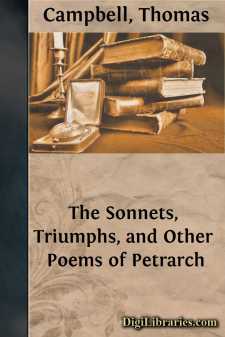Categories
- Antiques & Collectibles 13
- Architecture 36
- Art 48
- Bibles 22
- Biography & Autobiography 813
- Body, Mind & Spirit 142
- Business & Economics 28
- Children's Books 15
- Children's Fiction 12
- Computers 4
- Cooking 94
- Crafts & Hobbies 4
- Drama 346
- Education 46
- Family & Relationships 57
- Fiction 11828
- Games 19
- Gardening 17
- Health & Fitness 34
- History 1377
- House & Home 1
- Humor 147
- Juvenile Fiction 1873
- Juvenile Nonfiction 202
- Language Arts & Disciplines 88
- Law 16
- Literary Collections 686
- Literary Criticism 179
- Mathematics 13
- Medical 41
- Music 40
- Nature 179
- Non-Classifiable 1768
- Performing Arts 7
- Periodicals 1453
- Philosophy 64
- Photography 2
- Poetry 896
- Political Science 203
- Psychology 42
- Reference 154
- Religion 513
- Science 126
- Self-Help 84
- Social Science 81
- Sports & Recreation 34
- Study Aids 3
- Technology & Engineering 59
- Transportation 23
- Travel 463
- True Crime 29
The Sonnets, Triumphs, and Other Poems of Petrarch
by: Thomas Campbell
Categories:
Description:
Excerpt
THE LIFE OF PETRARCH.
The family of Petrarch was originally of Florence, where his ancestors held employments of trust and honour. Garzo, his great-grandfather, was a notary universally respected for his integrity and judgment. Though he had never devoted himself exclusively to letters, his literary opinion was consulted by men of learning. He lived to be a hundred and four years old, and died, like Plato, in the same bed in which he had been born.
Garzo left three sons, one of whom was the grandfather of Petrarch. Diminutives being customary to the Tuscan tongue, Pietro, the poet's father, was familiarly called Petracco, or little Peter. He, like his ancestors, was a notary, and not undistinguished for sagacity. He had several important commissions from government. At last, in the increasing conflicts between the Guelphs and the Ghibellines—or, as they now called themselves, the Blacks and the Whites—Petracco, like Dante, was obliged to fly from his native city, along with the other Florentines of the White party. He was unjustly accused of having officially issued a false deed, and was condemned, on the 20th of October, 1302, to pay a fine of one thousand lire, and to have his hand cut off, if that sum was not paid within ten days from the time he should be apprehended. Petracco fled, taking with him his wife, Eletta Canigiani, a lady of a distinguished family in Florence, several of whom had held the office of Gonfalonier.
Petracco and his wife first settled at Arezzo, a very ancient city of Tuscany. Hostilities did not cease between the Florentine factions till some years afterwards; and, in an attempt made by the Whites to take Florence by assault, Petracco was present with his party. They were repulsed. This action, which was fatal to their cause, took place in the night between the 19th and 20th days of July, 1304,—the precise date of the birth of Petrarch.
During our poet's infancy, his family had still to struggle with an adverse fate; for his proscribed and wandering father was obliged to separate himself from his wife and child, in order to have the means of supporting them.
As the pretext for banishing Petracco was purely personal, Eletta, his wife, was not included in the sentence. She removed to a small property of her husband's, at Ancisa, fourteen miles from Florence, and took the little poet along with her, in the seventh month of his age. In their passage thither, both mother and child, together with their guide, had a narrow escape from being drowned in the Arno. Eletta entrusted her precious charge to a robust peasant, who, for fear of hurting the child, wrapt it in a swaddling cloth, and suspended it over his shoulder, in the same manner as Metabus is described by Virgil, in the eleventh book of the Æneid, to have carried his daughter Camilla. In passing the river, the horse of the guide, who carried Petrarch, stumbled, and sank down; and in their struggles to save him, both his sturdy bearer and the frantic parent were, like the infant itself, on the point of being drowned....


